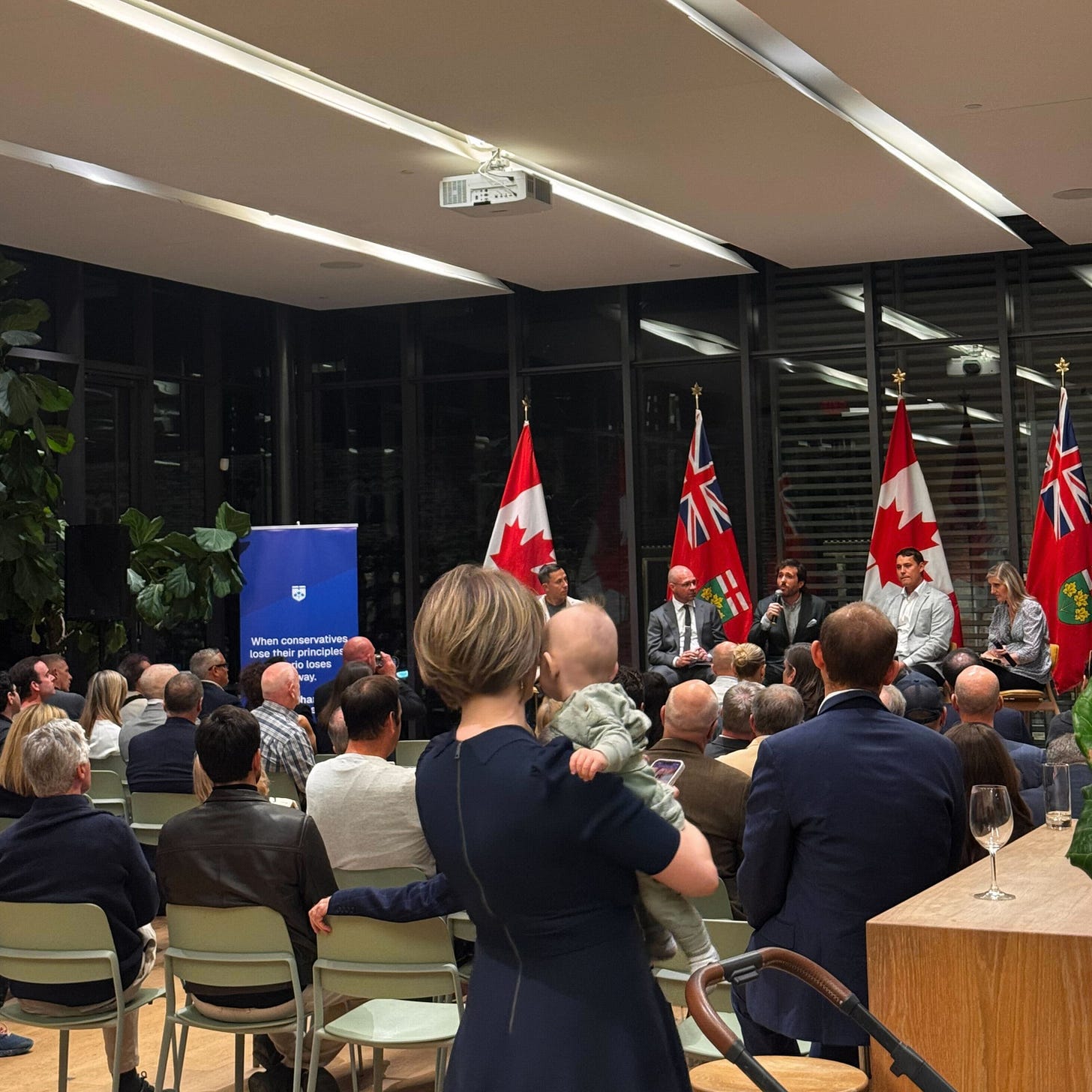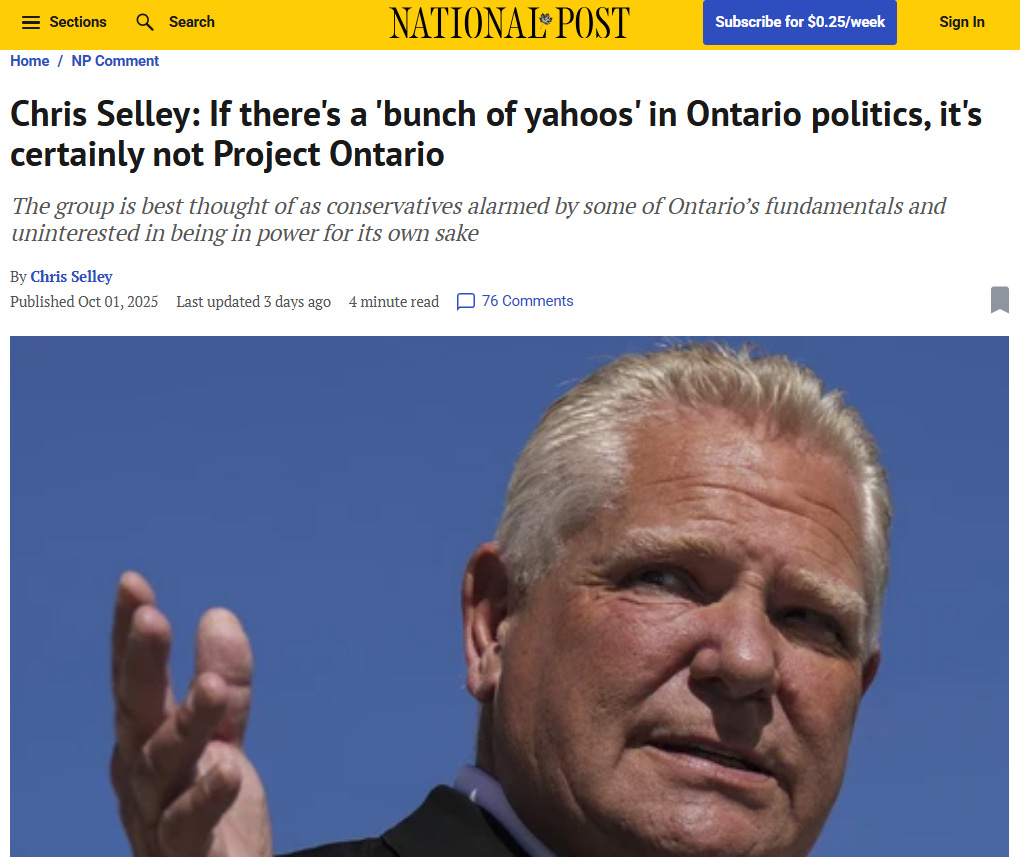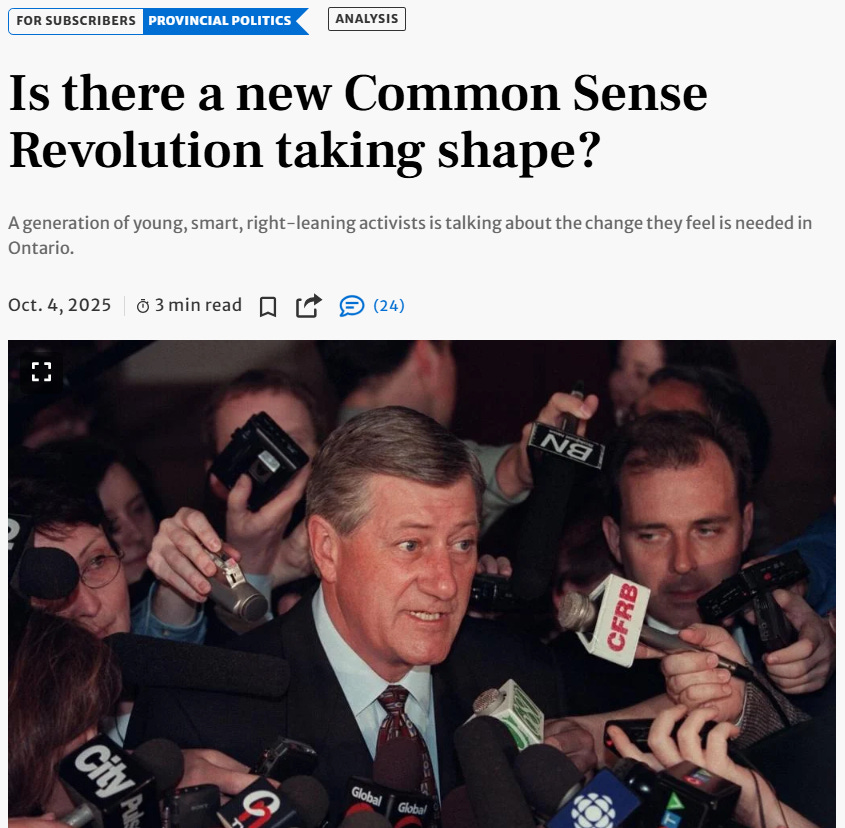Hated in Ford nation?
Reflecting on the hundreds of "radical rights" and "yahoos" who joined Project Ontario last week, the premier who has been told to hate what he doesn't understand, and the spectre of the CSR.

Editor’s note: Hours after this story was first published, Trillium broke the news of clients of lobbying firms with close connections to Premier Doug Ford being “hugely successful” in securing provincial funding — as much as $100 million to Rubicon clients, owned by Ford’s campaign manager — through a grant program Ontario’s auditor general recently characterized as “not fair, transparent or accountable.”
To borrow from George Grant’s Lament for a Nation, Ontario isn’t a province you love, it’s a province you worry about.
With every key indicator heading in the wrong direction: economic; cultural; housing starts off a cliff and a real estate Ponzi unravelling; rising net migration of the working-prime and fatigued and beleaguered — there’s not a whole lot to be excited about when these concerns keep being met with cheap ice cream parlour tricks, and bread and circus.
And yet, make enough noise, organize and elevate one’s principles above the kind of gutter-sniping witnessed predominantly heading in one direction between Ford’s inner circle during the federal election and the war-room in Ottawa, and one can be blessed enough to find themselves in the company of professionals they admire, who wish to share in that burden, and even lighten the load.
And if you’re even luckier, heading into your maiden, sold-out, Project Ontario event, which combined some of the nation’s top campaigners, advocacy organizations, economic and healthcare experts, builders, writers, and journalists, Premier Doug Ford will low-information smear you as “radical rights” and “yahoos,” leading to a room beyond capacity at 150+, appearances from leading politicians, a week filled with dozens of media and radio engagements across the project’s contributors, major features in The Globe and Mail, Toronto Star, National Post, QP Briefing, and text chains and inboxes filled with more support from business leaders, MPs, and MPPs. (Many of whom lament that they must remain private for the time-being, in response to some dodgy practices and unflattering allegations of pressure coming from behind the scenes at Queen’s Park.)
I — and we — are well aware that the media loves when conservatives attack conservatives.
This wasn’t — and isn’t — supposed to be that.
As I brought up on stage with Ginny Roth, Brian Dijkema, and Matt and Chris Spoke on September 30th at the Gardiner Museum — just steps from Queen’s Park, where Sir John A. Macdonald lay silently entombed in shame and indignity for five years under a three-term Progressive Conservative majority government — one of the great benefits of Mike Harris’s Common Sense Revolution was how he understood the role of the third-parties and that common sense, conservative advocacy space.
He would meet with groups like the National Citizens Coalition (where the writer is presently a director), he would tell all who would listen that every day at Queen’s Park he was told he couldn’t do something, and he’d endeavour to do it anyway — no matter the excuse. He knew that criticism from his right flank meant accountability, which no government should ever view itself as being above, and that it would provide the social license needed to pry that Overton Window open further to enact the meaningful growth and change required to keep Ontario as a “place to grow” and “yours to discover,” instead of one to leave.
Ginny, a top conservative strategist, noted that when Harris left office, his only regret was that he “didn’t do more, faster.”
That “more, faster,” was of the meaningful variety: sweeping tax cuts, achieving a balanced budget, welfare reform, shrinking government size (imagine that), introducing the ‘Sunshine List’ and Public Sector Salary Disclosure Act.
In juxtaposition — and if you’ve read the news today, oh boy — Doug Ford is back to pulling liquor off shelves, providing $27 million in ice cream sandwich subsidies, and broadening a central-planning economy that would make the 1980’s Eastern Bloc blush.
A harem of Ford consultants — and some particularly sweary Liberal consultants who are in partnership with them in media — believe that to be all hunky dory. As we heard from the MLI’s Tim Sargent at Project Ontario, that’s not how you’re supposed to run an economy — at least not a healthy one.
Economist Tim Sargent, a former federal bureaucrat and director of the domestic policy program at the Macdonald Laurier Institute, recalled a time when Ontario was (or at least was thought of) as “the strong heart of the Canadian economy” — insulated from the sort of booms and busts that roil Alberta. It was sort of the index fund of the federation.
The status quo bloody well shouldn’t be good enough now, and the Project Ontarians explained some of the reasons why:
Ontario’s GDP per capita relative to many other jurisdictions is rubbish: $62,338 in 2023, adjusted for purchasing-power parity, Agence France-Press reported earlier this year, which was good for fifth wealthiest among provinces. Only five U.S. states were lower on the same table. Ontarians are not in the habit of benchmarking themselves against the likes of Alabama and West Virginia.
Ontario’s GDP is barely rising half as fast as Quebec’s, never mind Alberta’s or Saskatchewan’s or Newfoundland’s.
Ontario now disburses more corporate subsidies than Quebec does. That shift began right when Ford, who promised to do away with corporate subsidies entirely — you know, like an actual conservative — took office. The kindest thing you can say about the return on investment is that it is very much to be determined. (Selley, National Post.)
Much of this can be owed to the expanded roll of a great wall of consultocracy that bars only those who have secured influence from reaching the premier. That is part of a broader concern with the ‘McKinsey model’ of how governments operate, and seek to further distance themselves from their once-intended stakeholders (the public) in favour of their growing stakeholders (the lobbying industry and their clients).
To be charitable, Ford isn’t wholly unique in his abuse of his model, and nor are the few who surround the premier who look out for their jobs first, over the jobs of a province with rising and record youth unemployment, and a limited path to upward social mobility. Self-interest and self-protection rackets are of course part of the human experience.
What remains unique has been the dynamic of a non-conservative running as a capital-C Conservative, and how that then leads to the small-c’s like yours truly and the associates he admires to be treated with hostility and disdain — because that non-securing of access and agreeability is viewed as a threat.
“'We have a room full of people who want to do more faster, and we’re branded yahoos and far-rights,' lamented conservative commentator Alexander Brown,” Chris Selley wrote in that National Post feature.
That was indeed my lament for that fledgling sub-sovereign nation, and that alarming sub-sovereign debt both economic and cultural. But this is also a moment for hope.
If the Toronto Star can find it in their hearts to describe us — or any conservatives — as “young, smart, right-leaning activists” behind a potential “new Common Sense Revolution,” there can surely be optimism for even the most stubborn and unprincipled of retail-political premiers and their apparatchiks.
At the very least, after watching this project take flight, and after meeting hundreds of self-respecting, upward-oriented Ontarians last week, who see through the nonsense and who aren’t incentivized to look the other way, I’m proud to say that one man’s “yahoos” are another man’s tribe.
And that tribe is growing.
Alexander Brown is a writer, communicator, and campaigner. He is a contributor to Project Ontario.





"More, Faster" appears to be the mantra of the current U.S. administration. Fixing a financial house of cards, ridding society of the "woke" phenomenon and attempting to tame warzones together represent an extraordinarily ambitious agenda - especially when mainstream media and the entire educational system are against it.
The Ontario situation is tiny compared to that south of our border, but is just as troublesome for its residents - whether they recognize it or not. That seems to be a major issue, as the media and professors certainly don't share the philosophy of Project Ontario and aren't inclined to promote common sense. Congratulations on a successful first confab Alex.
Ford's becoming a laughing stock with these circus antics.
Project Ontario... That's a good start.
Cheers.